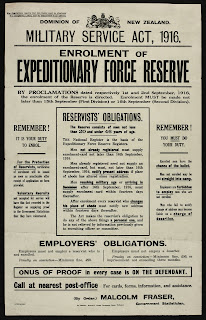Military Service Act of 1916
One hundred years ago today, 1 August 1916, conscription was introduced to New Zealand through the Military Service Act. The first names were drawn under the Act on 15 November 1916, and monthly ballots were repeated for the remainder of the war. As you can see from the poster, there were serious consequences for those who did not enrol.
Author: Andrew Henry
This had its
beginnings in the Defence Act of 1909 which introduced compulsory military training
to New Zealand. This was a controversial piece of legislation as critics saw it
as a short step away from conscription.
A large number of youths were prosecuted for failing to
register, and those who refused on conscientious grounds were fined or
imprisoned. By 1914 almost 5,000 young men had
been convicted for resisting compulsory military training and some were held in
military defaulters’ camps such as Rīpapa Island in Lyttelton Harbour.
One group from Christchurch, the Passive Resisters Union, produced an anti-conscription publication
called Repeal. This is a page from John A Lee’s copy of the March 1914 edition and these are his annotations you can see on the
page.
Within the first week
after war was declared 14,000 men volunteered for service at an average age of
23. But the voluntary system failed to provide a steady flow of troops, and led
to spikes and troughs in numbers.
As the war progressed, there was also a perceived inequality of sacrifice, with some families, regions, classes and occupational groups appearing to contribute greater numbers to the war effort than others. From May 1915 the horrors of Gallipoli and the sinking of the Lusitania led to calls for conscription to remove those inequalities.
The upshot was the
Military Service Act of 1916, which established the Expeditionary Force Reserve
consisting of every Pākehā male
between the ages of 20 and 46 years. From this Reserve all future reinforcements
were to be selected by ballot. It was later expanded to include Māori as
well.
A huge amount of resources have been created during the
centenary commemorations of the First World War. The National Library have
produced a specific research guide on conscientious
objectors during the First World War, while Auckland Libraries
developed a more general one.
Auckland Libraries have also created an online exhibition and an Auckland Weekly News
timeline of the First World War in New Zealand.






I want you to thank for your time of this wonderful read!!! I definately enjoy every little bit of it and I have you bookmarked to check out new stuff of your blog a must read blog! alistamento militar online
ReplyDelete